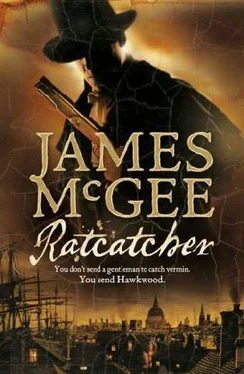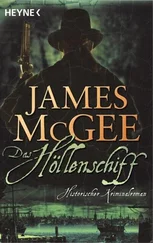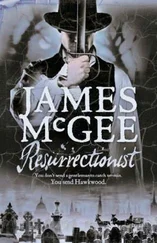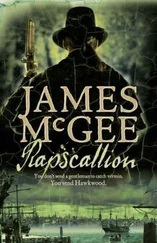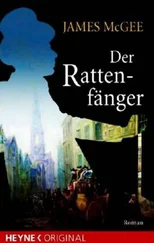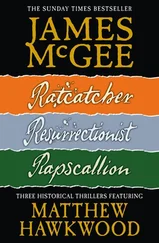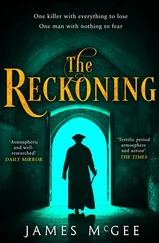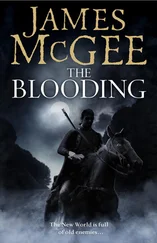James McGee - Ratcatcher
Здесь есть возможность читать онлайн «James McGee - Ratcatcher» — ознакомительный отрывок электронной книги совершенно бесплатно, а после прочтения отрывка купить полную версию. В некоторых случаях можно слушать аудио, скачать через торрент в формате fb2 и присутствует краткое содержание. Жанр: Исторический детектив, на английском языке. Описание произведения, (предисловие) а так же отзывы посетителей доступны на портале библиотеки ЛибКат.
- Название:Ratcatcher
- Автор:
- Жанр:
- Год:неизвестен
- ISBN:нет данных
- Рейтинг книги:4 / 5. Голосов: 1
-
Избранное:Добавить в избранное
- Отзывы:
-
Ваша оценка:
- 80
- 1
- 2
- 3
- 4
- 5
Ratcatcher: краткое содержание, описание и аннотация
Предлагаем к чтению аннотацию, описание, краткое содержание или предисловие (зависит от того, что написал сам автор книги «Ratcatcher»). Если вы не нашли необходимую информацию о книге — напишите в комментариях, мы постараемся отыскать её.
Ratcatcher — читать онлайн ознакомительный отрывок
Ниже представлен текст книги, разбитый по страницам. Система сохранения места последней прочитанной страницы, позволяет с удобством читать онлайн бесплатно книгу «Ratcatcher», без необходимости каждый раз заново искать на чём Вы остановились. Поставьте закладку, и сможете в любой момент перейти на страницу, на которой закончили чтение.
Интервал:
Закладка:
Hawkwood knelt by the fire grate. Scooping up a handful of ash, he rubbed it into his clothes. Untying the ribbon at the back of his neck, he smeared the rest of the ash into his hair. He returned to the mirror and studied the result. Not a bad transformation. Cursory, but it would have to do. No one would take him for a law officer. A labourer, perhaps, or a discharged soldier down on his luck.
Satisfied with his disguise, Hawkwood tucked his baton into his belt and left the room. Using the back stairs, he descended into the passageway at the rear of the tavern and slipped silently into the night.
Hawkwood proceeded with caution. Shadwell lay at the eastern end of the Ratcliffe Highway. The streets were becoming narrower and increasingly claustrophobic. There were no lamps here, no link-men to guide the way. It was as if the cobblestones had absorbed all the light. It might just as well have been the dark side of the moon. No honest men walked here at night, not if they valued their souls.
The sound of a bottle shattering against stone halted Hawkwood in his tracks. He melted into a patch of shadow, face half-turned to the wall, and waited. Across the street, two figures struggled in a drunken embrace. A bottle was raised and swung. One of the brawlers went down. The victor leaned over his fallen companion and booted him viciously in the side of the head. Then, after conducting a hurried search of the victim’s pockets, he rose and staggered away, the remains of the bottle trailing loosely in his hand.
Hawkwood stepped out, past the body sprawled in the gutter. He did not bother to check for signs of life. He knew, as soon as he was out of sight, the scavengers would move in, jackals drawn to a rotting carcass. The remains would be picked clean in minutes.
The houses were crude affairs, some wood-built, most of them brick, all packed tightly together; a breeding ground for disease. There had been an outbreak of typhus here not so long ago. It was unlikely the contagion had died out completely. Most likely, it was only lying dormant, biding its time, like an enemy in the undergrowth.
Hawkwood was no stranger to the area, though he didn’t know it well. Like the inhabitants of the rookeries, the people here kept themselves to themselves. Strangers weren’t welcome. He would have to tread carefully. Turning into a narrow lane, he headed towards the river.
He saw it as soon as he emerged from the alleyway: a dark, monstrous shape tethered to the far end of the wharf. Beyond its black hulk, a forest of mastheads reared towards a full moon, a bright pearl suspended against a curtain of black velvet. A thin veil of mist hovered over the water, as eerie as dragon’s breath. In the darkness every sound seemed unnaturally loud; the grating of a ship’s hull against a wharf stone, the groan of an anchor chain as a vessel moved against the tide, the slap of rigging against a masthead. Somewhere across the river, a ship’s bell tolled mournfully.
There were rumours that she’d started life as a merchantman for the East India Company transporting ivory and muslin, but had later been judged too small to turn a profit. Others hinted that she had plied a more odious trade, ending her days as a slaver on the notorious Middle Passage.
Whatever the truth, she had probably been beautiful in her prime, bows thrusting proudly into the wind and spray, sails spread against an azure sky. But that had been a previous incarnation. Now, left to her fate, she sat embedded in the Thames mud, a rotting derelict.
No one could remember her name. The letters that had adorned her once graceful stern had long since faded away. She’d gained her sobriquet by what she had become.
Countless strays had sought sanctuary within her reeking hull. Homeless seafarers originally, many of them foreigners; former East India men, abandoned by John Company and left to fend for themselves in a hostile land. Destitute, with no knowledge of the language and no means of finding a passage home. Strangers on a strange shore who had gravitated towards this dreadful place to be among their own kind. Wharf rats.
Hawkwood approached the vessel with caution. Away in the murk, something whimpered, as if in pain. A woman, or a child, it was impossible to tell.
There was a dampness in the air and a smell he could not place, sickly and cloying. It wasn’t coming from the river, he realized, it was seeping out of the hulk. As he drew closer, the smell grew stronger. When he stepped off the gangway on to the deck, the full stench hit him. He knew then what it was: the foul foetor of human misery.
Looking around, Hawkwood could see that almost every inch of deck space had been utilized. Every broken spar, every last strip of canvas, rigging and ratline had been pressed into service to form makeshift shelters. The result was a coagulation of tents, shacks and driftwood lean-tos that would have made a tinkers’ encampment a palace by comparison.
The forward deck grating had been removed, revealing the top rung of a steep companionway. Next to the open hatch, silhouetted by the faint lantern glow issuing from inside the hull, a shrunken figure squatted on its haunches. A pair of half-closed, slanted eyes, set in a wizened, jaundice-yellow face, peered up at him. A thin clay pipe jutted from the crea-ture’s lips. A bony hand, with claw-like nails, reached out, palm uppermost. Hawkwood dropped the coin into the outstretched fingers. The hand withdrew and Hawkwood descended into the pit.
Hawkwood was no stranger to life on board ship. The voyage across the Atlantic to retake Buenos Aires had not been the most pleasurable of experiences. Life below deck had been hard. Hawkwood remembered with loathing the closely packed bodies, the sickness and the appalling food, not to mention the inability to walk upright. The voyage home had been even worse. Violent storms had tossed the vessel around like a cork. There had been times during the passage when, spewing his guts over the lee rail, he would have welcomed death with open arms. But not even those weeks of purgatory could have prepared him for this.
The smell was overpowering, as if something had died and been left to decompose. There was illumination, of sorts, from oil lamps and candles, but if ever a place could be truly called a hell-hole, Hawkwood decided, this was it.
He was standing on what looked to be the remains of the mess deck. There were several crudely built benches and tables, some of them occupied. Whether by the living or the dead, it was hard to tell. Dressed in rags and slumped like corpses, they could have been either, or both. Rats slithered past his feet and darted across the table tops. The air was as rank as a sewer.
Hawkwood picked out the corner of an empty pew and sat down. He felt something slither over his boot. He kicked out and was rewarded with a faint squeal.
“You want grog, culley?”
Hawkwood looked up. The man’s surly expression indicated that he didn’t care one way or the other. Hawkwood nodded, though he had no intention of allowing anything to pass his lips in a sty such as this. A dirty tin mug was placed in front of him and the noxious brew was poured. Hawkwood wiped a sleeve across his face and handed over a coin. The pot man shuffled away. Nothing else to do now except wait, and wonder what had possessed Jago to choose such an unsavoury place for a rendezvous.
Half a dozen benches away, close by the port bulkhead and out of Hawkwood’s line of sight, the pot man answered the summons of a crooked finger.
“Well?”
The pot man nodded sullenly. “It’s ’im.”
“You’re sure?”
“I’m sure. ’E’s dressed rough, but I saw the scar, didn’t I? Under ’is eye, right where you said it’d be. Looks an ’ard bastard, if you ask me.”
A coin was placed on the table. “No one’s asking you, Cooter. On your way.”
Читать дальшеИнтервал:
Закладка:
Похожие книги на «Ratcatcher»
Представляем Вашему вниманию похожие книги на «Ratcatcher» списком для выбора. Мы отобрали схожую по названию и смыслу литературу в надежде предоставить читателям больше вариантов отыскать новые, интересные, ещё непрочитанные произведения.
Обсуждение, отзывы о книге «Ratcatcher» и просто собственные мнения читателей. Оставьте ваши комментарии, напишите, что Вы думаете о произведении, его смысле или главных героях. Укажите что конкретно понравилось, а что нет, и почему Вы так считаете.
